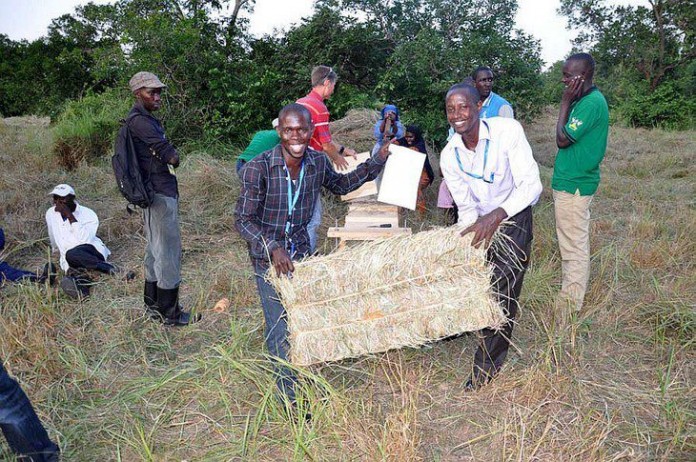UNIVERSITY PARK, Pa. — A project spearheaded by scientists in Penn State’s College of Agricultural Sciences and Uganda’s Makarere University is helping African youths establish businesses and generate income.
And these young people, in turn, are providing services that can help farmers improve dairy nutrition and increase milk production.
Workshop
This summer, Sjoerd Duiker, associate professor of soil management and applied soil physics, and Ephraim Govere, research support associate and manager of the college’s Soil Research Cluster Laboratory, collaborated with a team of Kenyan youth and Ugandan scientists to provide a two-week workshop for unemployed youth and small-farm operators in hay mowing and baling technologies.
The training was part of the Youth Employment and Income Enhancement Project headed by the Africa Institute for Strategic Animal Resource Services and Development, which is housed at Makarere University.
The project is supported by the Global Knowledge Initiative, a nonprofit organization based in Washington, D.C., and the National Agricultural Advisory Services of the government of Uganda.
Duiker said the workshop taught participants how to mow grass using scythes and how to construct an innovative manual hay baler originally designed by Tiller’s International, a nongovernmental organization in Michigan.
“This equipment is a first step in improving the feeding of dairy cows, which often are undernourished in East Africa,” he said. “Quality hay can feed cattle in the dry season when pasture is in short supply, but it also can be transported easily from feed-surplus to feed-deficit areas when packed in dense bales made with the help of the manual hay baler.”
Introduction
Duiker first introduced this technology in December 2011 in Nyeri, Kenya. He noted that it has enabled formerly destitute youth to create a hay-baling custom service for farmers in the Mount Kenya area.
“These young men also built several hay balers for farmers and made handles for scythes,” he said.
“Two of the Kenyan youth helped us and our partners from Makarere University to train Ugandans in the manufacture and operation of the haymaking equipment.”
The hands-on workshop drew 63 participants, consisting of youth and representatives from interested farmer organizations and the Ugandan extension service.
The participants were required to submit a business concept at the end of the training. Those who successfully launch a business will receive a diploma during an international colloquium to be held in Uganda in the spring of 2014.
Duiker explained that introducing these affordable but effective technologies can help reduce widespread hunger and poverty in sub-Saharan Africa.
The World Bank estimates that nearly half of the population in the region lives below the poverty line of $1.25 per day.
“By improving feeds and feed technologies, the training contributes to the vision of the government of Uganda to increase milk production from 1.5 billion to 6 billion liters annually,” Duiker said. “Using appropriate technology, growth in the dairy sector can lift millions out of poverty, as shown by the lives of the young Kenyan trainers.”
In addition to the recent training, project staff this fall will carry out a soil-plant ecosystem assessment to identify available forage types for their potential in various Ugandan ecological zones and to measure soil and forage quality.
Penn State’s Govere also will assess the laboratory capabilities of Makerere University and the Africa Institute for Strategic Animal Resource Services and Development to ensure sustainable testing of forage quality and soil fertility.
Ugandan government officials praised the partnering universities for reaching out to introduce knowledge and technology that has a high potential to impact the livelihoods of the country’s citizens in a practical, hands-on manner.
“(Our) government policy is to commercialize agriculture — to transform subsistence agriculture to commercial agriculture,” Minister of Animal Industry Bright Rwamirama told participants at the conclusion of this summer’s training.
Empower
“This (project) will help create employment for our young people, produce more food for our people and other people of the world, and bring much needed foreign exchange and economic transformation of our country.”
Duiker said besides teaching African youth to generate income and helping farmers to boost milk production, the project helps sustain itself by training participants to share their new-found knowledge.
“If we really want to make an impact, we should empower youth so they can develop their own businesses, but also so they can train others to do the same thing.”











That is very inspiring to hear. There are many such small scale business that African and for that matter world youth should be working on. And dairy industry is a good one to start. Quality feed for dairy cows is not only essential but also under shortage.
Mike.
Hello,
This is a great article. I live in the rural semi arid Kajiado County and would be happy to have instructions on how to make a manual baler.